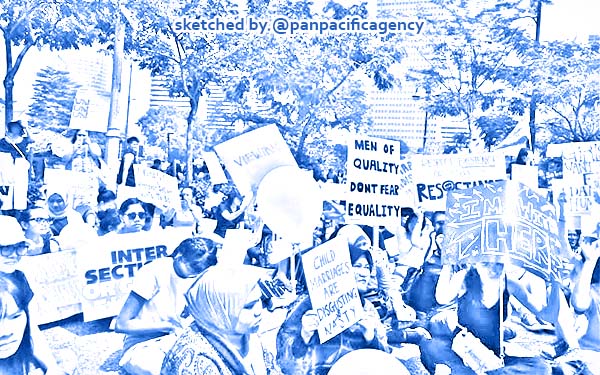Slow pace of human rights reforms in Malaysia, says Amnesty

Women march in Malaysia. Photo: FMT/Facebook. Sketched by the Pan Pacific Agency.
PETALING JAYA, Jan 30, 2020, FMT. A report by international rights group Amnesty International has shown delays in the implementation of human rights policies by the Pakatan Harapan (PH) government, Free Malaysia Today reported.
The report called the “Human Rights in Asia-Pacific: A review of 2019” said despite the government taking steps towards implementing the Independent Police Complaints and Misconduct Commission (IPCMC), repressive laws limiting the rights to freedom of expression and peaceful assembly were still in use.
“The government accepted more recommendations during a review of its human rights record at the UN Human Rights Council than ever before. However, it rejected recommendations to protect the rights of the lesbian, gay, bisexual, transgender, and intersex (LGBTI) community and the indigenous people.
“The government also backtracked from its decision to join the Rome Statute of the International Criminal Court in April, a month after it had promised to accede to it.”
The Amnesty report also highlighted ongoing issues with freedom of expression and assembly.
It said the PH government continued to use laws to limit freedom of expression, such as the Sedition Act and the Communications and Multimedia Act.
It observed that such laws were enforced against individuals making comments deemed sensitive, involving race, religion or royalty.
The report cited examples such as the imprisonment of islamic preacher Wan Ji Wan Hussin and a government ban against the “Belt and Road Initiative for Win-Winism” comic book promoting China’s foreign policy goals in Malaysia.
Wan Ji was sentenced to a year in prison after failing in his appeal against a 2014 conviction under the Sedition Act over comments he had made about the Sultan of Selangor.
Meanwhile, the Belt and Road comic was banned by the home ministry in October last year for “(trying) to promote communism and socialism ideologies.”
On a separate note, the report also noted some restrictions to the right to peaceful assembly.
It said that amendments to the Peaceful Assembly Act 2012 in July had allowed for fewer restrictions on processions, marches, and other forms of peaceful demonstration, and to shorten the notification period required for assemblies from 10 to seven days prior.
However, it observed that authorities had questioned organisers of an International Women’s Day march last year and opened investigations on organisers who had protested over the government’s decision to allow rare-earth company Lynas to continue operations.
“Similar action was taken in October, following a pro-Hong Kong solidarity march in Kuala Lumpur.”
The report also noted a lack of freedom of religion, citing the Kelantan state government’s plans to convert all indigenous people in the state to Islam by 2049, and the raid against a dozen Shias who held a private gathering for Ashura in September 2019, among others.
“Witnesses reported that the police ill-treated those detained in a raid in Johor, including threatening some detainees with a gun. They were later released,” the report said, referring to the widespread crackdown on Shias in the country last year.
Speaking to reporters after a panel discussion on the report, Amnesty International Malaysia’s executive director Shamini Darshini said they observed an increase of young activists from across the country fighting on different issues.
“For example, we saw a group of children in Penang who put on a play protesting unsustainable palm oil cultivation. And we will see more of those examples this year.”
She added that there were improvements in how civil society and activists organised and came together for their various causes.
One of the examples was the Undi18 group, who pushed the government to pass a constitutional amendment lowering the voting age for Malaysians to 18.
Meanwhile, speaking on the government’s political will in addressing human rights, she said Putrajaya lacked leadership and structure in their plans for reforms and were very slow in terms of progress.
“The government has made announcements in the manifesto, and subsequently, about making human rights reforms but we seem to be running around in circles.“